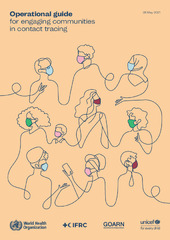Operational guide for engaging communities in contact tracing
Description
Contact tracing is a key component of a public health response to infectious disease outbreaks. The purpose of this guidance is to reinforce the place of community engagement and participation in the contact tracing process. The guidance and related products articulate best practice principles for community engagement and how they can be operationalized as part of any community-centred contact tracing strategy. The material provided can stand on its own or be used to complement other documents that support strategies, implementation plans or training and capacity building modules.
The guide includes:
-
- Key principles for engaging communities
- Standard operating procedures to support implementation of principles
- Important community engagement indictors to measure impact and success (detailed indicator bank)
- Adapted social ecological model to help identify barriers and opportunities at all levels to support contact tracing
- Vetted reference guide for community-centred COVID-19 contact tracing
Key principles for engaging communities in contact tracing
The purpose of this video is to reinforce the place of community engagement and participation in the contact tracing process. The video articulates best practice principles for community engagement and how they can be operationalized as part of any community-centered contact tracing response.
Case study 1: Building trust and ensuring success through student engagement
The Austrian Red Cross, in partnership with the Ministry of Health, created and promoted, STOP CORONA, Europe’s first COVID-19 digital contact tracing app. They quickly learned that high levels of trust cannot be taken for granted, as citizens believed personal information was being shared. This case study explores how the Red Cross responded to the trust deficit with key community engagement principles highlighted in the WHO’s ‘Operational guidance for engaging communities in contact tracing’.
Case Study 2: Building trust with transparency
Students in Leuven, Belgium make up half the city’s 100,000 population, with the majority living in close quarters which hampered their ability to exercise recommended COVID-19 social distancing protocols. This case study explores how the University created a student lead testing and tracing centre which leveraged the WHO’s key principles for community engagement to build trust and improve the uptake of contact tracing and testing protocols.
Case study 3: Helping communities overcome stigma through inclusion
Faith-based organizations like Circle of Hope are well-integrated in communities, thanks to a deep understanding of local customs, needs, and realities, that have helped increase levels of trust. This case study explores how community engagement trainings of local healthcare professionals, faith leaders and youth volunteers led to immense uptake of contact tracing protocols and improved health services amongst previously reluctant communities.
Additional languages

DETAILS
Publication
Authors
Emergency
Scope
Language
Region
Keywords
